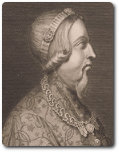The Wife of Bath's Prologue and Tale Contents
- The Prologue: introductory comments
- Part one: l.1 'Experience' - l.76 'Cacche whoso may'
- Part two: l.77 'But this word' - l.134 'To purge uryne'
- Part three: l.135 'But if I seye noght' - l.162 ' Al this sentence'
- Part four: l.163 'Up sterte' - l.192 'For myn entente'
- Part five: l.193 'Now sires' - l.234 'Of hir assent'
- Part six: l.235 'Sire old kanyard' - l.307 'I wol hym noght'
- Part seven: l.308 'But tel me this' - l.378 'This know they'
- Part eight: l.379 'Lordinges, right thus' - l.452 'Now wol I speken'
- Part nine: l.453 'My forthe housebonde' - l.502 'He is now in the grave'
- Part ten: l.503 'Now of my fifthe housebond' - l.542 'Had told to me'
- Part eleven: l.543 'And so bifel' - l.584 'As wel of this'
- Part twelve: l.585 'But now, sire' - l.626 'How poore'
- Part thirteen: l.627 'What sholde I seye' - l.665 'I nolde noght'
- Part fourteen: l.666 'Now wol I seye' - l.710 'That women kan'
- Part fifteen: l.711 'But now to purpos' - l.771 'Somme han kem'
- Part sixteen: l.772 'He spak moore' - l.828 'Now wol I seye'
- Part seventeen: The after words l.829 'The frere lough' - l.856 'Yis dame, quod'
- The Wife of Bath's Tale: Introductory comments
- Part eighteen: l.857 'In the' olde days' - l.898 'To chese weither'
- Part nineteen: l.899 'The queen thanketh' - l.949 'But that tale is nat'
- Part twenty: l.952 'Pardee, we wommen' - l.1004 'These olde folk'
- Part twenty-one: l.1005 'My leve mooder' - l.1072 'And taketh his olde wyf'
- Part twenty-two: l.1073 'Now wolden som men' - l.1105 'Ye, certeinly'
- Part twenty-three: l.1106 'Now sire, quod she' - l.1176 'To lyven vertuously'
- Part twenty-four: l.1177 'And ther as ye' - l.1218 'I shal fulfille'he Holocaust and the creation of
- Part twenty-five: l.1219 'Chese now' - l.1264 'God sende hem'
- Reaction to the Wife's Tale
- Themes in The Wife of Bath's Tale
- The struggle for power in The Wife of Bath's Prologue
- The 'wo' that is in marriage
- The portrayal of gender in The Wife of Bath's Prologue and Tale
- Desire and The Wife of Bath's Tale
- Is there justice in The Wife of Bath's Tale
- Social criticism in The Wife of Bath's Prologue and Tale
- Marriage and sexuality in The Wife of Bath's Prologue and Tale
- Mastery in The Wife of Bath's Prologue and Tale
- Debate, dispute and resolution in The Wife of Bath's Prologue and Tale
- Tale and teller in The Wife of Bath's Prologue and Tale
Other writers from Chaucer's time
Texts before authors
It is easier to talk of individual texts rather than individual writers from Chaucer's time. The second half of the 14th Century was a time of great poetical achievement. However, none of the poets we know of had a life like Chaucer's – born and educated in London, marrying well and entering royal service.
William Langland
William Langland was born c 1331 and died c 1400, and was therefore active throughout Chaucer's life, but we know little about him in detail. He is believed to be the author of a great poem The Vision of Piers Plowman, but the evidence is not clear. Nevertheless, the poem exists, and if it was circulated during the 14th Century Chaucer would surely have known it, particularly as Langland lived and worked in London for much of his life. Langland also satirises abuses within the Church.
John Gower
 John Gower (c 1330- 1408) was another close contemporary of Chaucer's. Between 1390 and 1393 he wrote a poem entitled Confessio Amantis. Like The Canterbury Tales, this is another collection of tales within an overall structure, in which the courtly lover struggles to become a virtuous man. The tales are generally taken from the Metamorphoses by the Roman writer Ovid. Chaucer also used Ovid's stories, for instance in The Wife of Bath's Tale, but placed within Gower's vision.
John Gower (c 1330- 1408) was another close contemporary of Chaucer's. Between 1390 and 1393 he wrote a poem entitled Confessio Amantis. Like The Canterbury Tales, this is another collection of tales within an overall structure, in which the courtly lover struggles to become a virtuous man. The tales are generally taken from the Metamorphoses by the Roman writer Ovid. Chaucer also used Ovid's stories, for instance in The Wife of Bath's Tale, but placed within Gower's vision.
Boccaccio
Boccaccio was an Italian who lived from 1313-1375, and whose life therefore overlapped with Chaucer's. His poem Filostrato greatly influenced Chaucer – indeed the first third of Chaucer's Troilus and Criseyde is a translation of Boccaccio's work.
Chaucer's literary world
Chaucer certainly knew Gower, lived in London for a number of years when Langland was there, and could possibly have met Boccaccio in Italy – though there is of course no evidence whatsoever that he did so. There was an active literary life in London, in which foreign influences (particularly Italian and French) were being absorbed by writers in English.
None of the works referred to here was printed before the 1470s, but literary life, though limited, was active in places like London, and the poems would have been read in manuscript, or heard recited, by those interested.
Chaucer's legacy
The influence of Chaucer was immense:
- on the development of English poetry
- on the development of the English language.
The poet John Dryden (1631-1700) called him
‘the well of English undefiled',
a tribute to his influence. (However, he also thought that his own ‘translations' of Chaucer improved the original by putting them in more polished language!)
